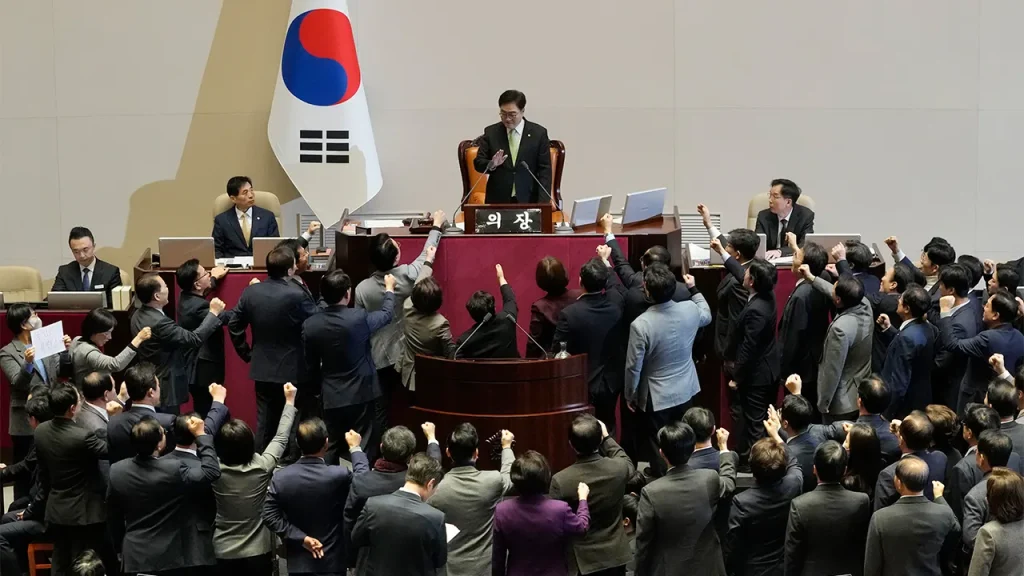South Korea’s political landscape has been thrown into disarray following the impeachment of Acting President Han Duck-soo by the opposition-controlled National Assembly. This dramatic move further exacerbates the crisis ignited by President Yoon Suk Yeol’s controversial imposition of martial law and subsequent impeachment, leaving the nation grappling with unprecedented political instability, economic uncertainty, and damage to its international standing. Han’s impeachment effectively strips him of presidential powers and duties pending a Constitutional Court review, which will determine whether to dismiss or reinstate him. This adds another layer of complexity to the ongoing constitutional crisis, as the court is simultaneously deliberating on the validity of President Yoon’s impeachment.
The National Assembly voted 192-0 in favor of Han’s impeachment, with the governing People Power Party (PPP) boycotting the proceedings. PPP lawmakers vehemently protested the vote, claiming it was “invalid” due to a procedural dispute over the required majority. They argued that a two-thirds majority was necessary, while the Speaker of the Assembly maintained that a simple majority sufficed for impeaching an acting president. The lack of specific legal provisions for impeaching an acting president added fuel to the fire, highlighting the unprecedented nature of the situation. While the PPP’s disruptive actions underscored the deep political divisions within the country, the vote proceeded without any reported violence or injuries.
Han Duck-soo, who assumed the role of acting president after Yoon’s impeachment, expressed regret over the assembly’s decision but stated his respect for the process and pledged to suspend his duties to avoid further turmoil. He placed his faith in the Constitutional Court’s ability to swiftly and judiciously resolve the matter. With Han’s powers suspended, Deputy Prime Minister and Finance Minister Choi Sang-mok stepped in to lead the government. Choi immediately sought to address potential security concerns by directing the military to enhance its readiness posture, aiming to deter any North Korean miscalculations or provocations that might exploit the political instability. He also reassured international partners, including the US and Japan, that South Korea’s foreign policy remained unchanged.
The seeds of this political crisis were sown by President Yoon’s short-lived declaration of martial law on December 3rd, a move that triggered widespread condemnation and ultimately led to his impeachment. Han, appointed as prime minister by Yoon, inherited a deeply polarized political environment and quickly found himself at odds with the main liberal opposition, the Democratic Party. The conflict centered on several key issues, including the appointment of three vacant Constitutional Court justices, an independent investigation into Yoon’s martial law decree, and pro-farmer legislation. The Democratic Party accused Han of obstructing these initiatives and of complicity in Yoon’s alleged abuse of power.
The Democratic Party’s push to fill the vacancies on the Constitutional Court became a particularly contentious point. The party argued that a full nine-member bench was necessary for a legitimate ruling on Yoon’s impeachment, while Yoon’s allies resisted the appointments, fearing that additional justices might increase the likelihood of his removal. The requirement of at least six justices to uphold an impeachment decision made the composition of the court a crucial factor in Yoon’s political fate. Han’s refusal to appoint the justices without bipartisan consensus ultimately triggered the impeachment motion against him. This intricate interplay of political maneuvering and legal procedure underscores the fragility of South Korea’s democratic institutions amid this unprecedented crisis.
The ongoing investigations into President Yoon’s actions further complicate the political landscape. Accused of rebellion and abuse of power, Yoon has repeatedly declined to cooperate with investigators, while several senior officials, including his defense minister and police chief, have been arrested in connection with the deployment of troops and police to the National Assembly during the martial law period. The indictment of former Defense Minister Kim Yong Hyun, a close associate of Yoon, marks a significant development in the legal proceedings and signals the potential for further high-profile charges. The impeachment motion against Han accuses him of collaborating with Yoon in the martial law declaration, obstructing the appointment of Constitutional Court justices, and hindering investigations into Yoon’s alleged rebellion. The outcome of these investigations and the Constitutional Court’s decisions on both impeachments will have far-reaching consequences for the future of South Korean politics and governance.


